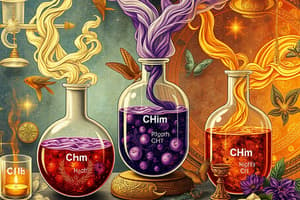Podcast
Questions and Answers
What are the two types of changes that can occur in chemical reactions?
What are the two types of changes that can occur in chemical reactions?
Chemical reactions encompass changes that only involve the positions of electrons in the forming and breaking of chemical bonds between atoms, with no change to the nuclei (no change to the elements present), and can often be described by a chemical equation. Nuclear chemistry involves the chemical reactions of unstable and radioactive elements where both electronic and nuclear changes can occur.
What are the substances initially involved in a chemical reaction called?
What are the substances initially involved in a chemical reaction called?
The substance (or substances) initially involved in a chemical reaction are called reactants or reagents.
What do chemical reactions yield?
What do chemical reactions yield?
Chemical reactions yield one or more products, which usually have properties different from the reactants.
What are elementary reactions in the context of chemical reactions?
What are elementary reactions in the context of chemical reactions?
What is nuclear chemistry and how does it differ from classical chemical reactions?
What is nuclear chemistry and how does it differ from classical chemical reactions?
Flashcards are hidden until you start studying
Study Notes
Chemical Reactions
- Chemical reactions involve two types of changes: physical changes (change in state or phase, e.g., solid to liquid) and chemical changes (change in composition, e.g., burning wood).
Reactants and Products
- The substances initially involved in a chemical reaction are called reactants or starting materials.
- Chemical reactions yield products, which are the substances formed as a result of the reaction.
Elementary Reactions
- Elementary reactions, also known as elementary steps, are the simplest reactions in a complex reaction mechanism, involving a single reaction step or a single transition state.
Nuclear Chemistry
- Nuclear chemistry is the study of chemical reactions involving changes in the nucleus of an atom, such as nuclear fission or fusion reactions.
- Nuclear chemistry differs from classical chemical reactions, which involve changes in the electron configuration or bonding between atoms, not affecting the nucleus.
Studying That Suits You
Use AI to generate personalized quizzes and flashcards to suit your learning preferences.





